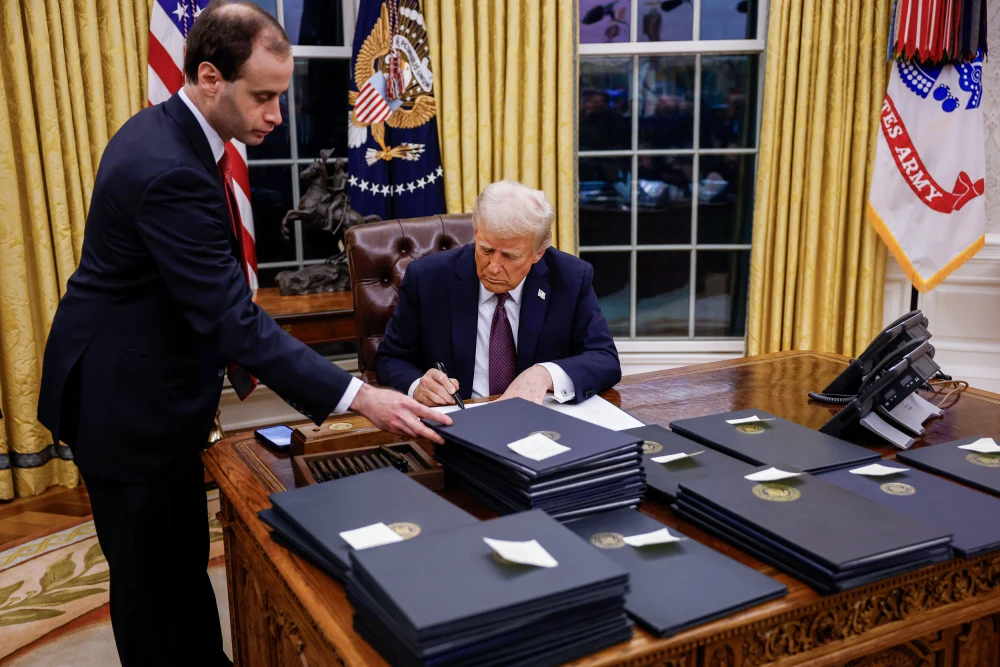When an incoming White House official announced Donald Trump’s executive order dismantling federal diversity, equity and inclusion programs, the official invoked a familiar line:
“This order is meant to return to the promise and the hope that was captured by civil rights champions, that one day all Americans can be treated on the basis of their character, not by the color of their skin.”
The statement echoed a well-known quote from Martin Luther King Jr.’s 1963 “I Have a Dream” speech, in which King declared, “I have a dream that my four little children will one day live in a nation where they will not be judged by the color of their skin but by the content of their character.”
Nika White, who runs a consulting company that specializes in DEI, called the use of King’s words to support attacks on DEI “disgusting.”
“It is disheartening that they would use the words of Dr. King and weaponize it as part of the conversation to dismantle what Dr. King very much stood for, which is, opportunity for those who are represented,” White said.
“This is a way for them to cause people to be confused about what they’re after, which is taking full power in ways that create a continuation of disparities for others.”
King’s daughter Bernice King condemned conservatives’ use of her father’s words in a post on X: “To every politician: The next time you quote my father, let it be in support of voting rights, civil rights, or human rights. Or in support of eradicating racism, poverty, and war. Or in support of reparations, a livable wage, or ending police brutality.”
King’s eldest son, Martin Luther King III, condemned the attacks on DEI in an interview with NBC News last week.
“There are people who are qualified but don’t have the opportunity because” they are overlooked, he said.
The anti-DEI order is among more than a dozen campaign promises Trump said he planned to carry out on his first day in office, including launching a mass deportation program, ending gender-affirming care practices, advancing education restrictions and more.
“It is ending radical and wasteful government DEI programs and preferencing,” the official told reporters of the executive order. “So this order is meant to create equal treatment and end DEI inside the federal government.”
Conservatives have routinely drawn criticism for taking King’s words out of context and using them to support right-wing agendas. In 2021, Bernice spoke with MSNBC about the misuse of her father’s words.
“Do not take excerpts from my father,” she said. “Study him holistically. He wrote extensively. That’s the beauty of all of this, there are books out … so the record will continue to be straight. For people to be able to misappropriate him this way is actually beyond insulting.”
Hours later, in his inaugural address, Trump noted that it was “Martin Luther King Day, and his honor, this will be a great honor, but in his honor we will strive together to make his dream a reality. We will make his dream come true.”
Conservatives commonly use King’s words when speaking about their plans to end racial equity initiatives and carry out other conservative efforts, said historian William Horne, assistant editor of the University of Maryland’s Freedmen and Southern Society Project and co-founder of The Activist History Review.
In 2021, while introducing legislation to allow students to sue schools for teaching race-conscious information, Republican Gov. Ron DeSantis of Florida remarked that King “didn’t want people judged on the color of their skin, but on the content of their character.” Former House Speaker Kevin McCarthy said that “critical race theory goes against everything Martin Luther King Jr. taught us — to not judge others by the color of their skin.”
But, Horne said, “if you simply look into any of Dr. King’s work, it’s very clear that he’s arguing for something really radical.”
King’s speech, delivered at the March on Washington for Jobs and Freedom, was a defining moment in the Civil Rights Movement and marked a turning point in the national conversation about race and systemic oppression. King championed racial equity and implored the nation’s leaders to address the systemic oppression plaguing Black communities. In this speech and others, he called attention to the ways Black people were strategically disadvantaged based on race. He was also consistently demonized by U.S. leaders and surveilled by the federal government.
Conservatives, Horne added, “don’t really care about his work. They really care about a different way of framing white supremacy, not as state violence. I wish I could say that it doesn’t work. Historically, we’ve seen these very tactics work, this exact kind of rhetoric is the very rhetoric that helped sponsor Jim Crow.”
Dismantling DEI through lawsuits and legislation has become part of the “anti-woke” political movement. Trump and his backers have long vowed to wipe out federally funded diversity programs. Trump’s order requires government agencies to assess any DEI programs and work to eliminate them. In a Monday call with reporters, the official said it was “very fitting” to announce the order on Martin Luther King Jr. Day. As part of the order, deputies from several federal agencies will meet monthly to discuss ways to eliminate DEI programs.
Diversity, equity and inclusion programs and roles have been around for decades but gained momentum after George Floyd’s murder in 2020, with companies and agencies working to achieve an ethnically balanced workforce and more inclusive workplaces. DEI roles began to increase drastically amid the national conversation about ways to promote racial equity.
Black workers account for 18% of the federal workforce, according to the Office of Personnel Management, more than their 14% share of the national population.

